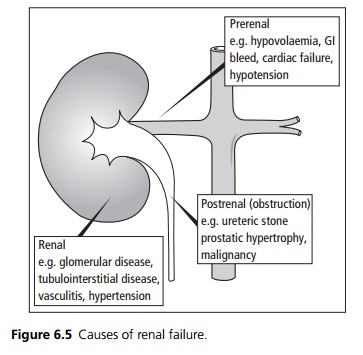Chapter: Medicine and surgery: Genitourinary system
Renal failure - Disorders of the kidney
Disorders of the kidney
Renal failure
Definition
Renal failure is defined as a reduction in the glomerular filtration rate (GFR), which leads to a loss of the ability of the kidney to perform its functions properly.
The kidneys have three important functions:
1. Fluid and electrolyte balance, including acidŌĆōbase balance.
2. Excretion of waste products and many drugs and toxins.
3. Hormone synthesis (such as erythropoeitin, vitamin D and renin).
A normal kidney has 1 million nephrons. The nephron is the basic unit of the kidney. It consists of the glomerulus and its associated vascular supply and the tubules, loop of Henle and collecting ducts. There is a large degree of redundancy in the kidney, so many nephrons may be lost before there is a noticeable change in fluid and electrolyte balance, and even more before there are symptoms of renal failure.

It is useful when considering the causes of renal failure to divide the kidney into three parts (see Fig. 6.5).
┬Ę Blood supply (aorta, renal arteries etc.) ŌĆō prerenal.
┬Ę Parenchyma (the ŌĆśmeatŌĆÖ of the kidney, consisting of nephrons and interstitium) ŌĆō renal.
┬Ę Draining system (the renal pelvis, ureters and bladder outflow) ŌĆō postrenal.
More than one type may coexist, as prerenal or postrenal failure can lead to parenchymal involvement.
┬Ę In prerenal failure, the kidney is not damaged but functionally compromised due to ischaemia, so reversal of the cause leads to prompt recovery of renal function, although in some cases correction can be difficult.
┬Ę In renal failure, there is evidence of parenchymal disease. There may be a preexisting prerenal factor, which led to renal damage. Recovery may be possible, though if the disease is severe and scarring results, full functional recovery is unlikely.
┬Ę With postrenal failure as with prerenal failure, early treatment can avert irreversible damage to the kidneys. If left undetected for some time, for example one kidney is first affected without causing symptoms, then the other precipitates renal failure, there may be permanent loss of function.
Renal failure causes
1. A rise in serum concentrations of urea, creatinine, hydrogen ions (causing a metabolic acidosis) and potassium (hyperkalaemia). The rate at which these rise depends on a number of factors, including how catabolic the patient is, i.e. the rate of tissue break-down, in particular muscle breakdown causes a marked rise in potassium. Uraemia (a term used to describe raised urea and creatinine) is associated with anorexia, nausea, vomiting and increased bleeding tendency (due to a reduction in platelet function). Neurological effects include confusion, myoclonus and lowered seizure threshold. It is thought that urea and creatinine are not directly responsible for the observed clinical features but that there are other uraemic toxins which rise in parallel with urea and creatinine.
2. Loss of the kidneysŌĆÖ ability to manage salt and water. Oliguria (urine output <15 mL/hour or <400 mL/ 24hour) is common, but does not occur with all causes of renal failure. This can cause fluid overload, i.e. peripheral oedema and pulmonary oedema, particularly in those with impaired cardiac function, the elderly, and those given excessive amounts of intravenous fluids in order to try and reverse a preceding hypovolaemic state. Water retention can lead to hyponatraemia.
3. Reduced production of 1, 25-dihydroxycholecalciferol, which can lead to low calcium, and reduced excretion of phosphate causes hyperphosphataemia. High phosphates cause pruritus (itching), chronic renal failure leads to renal osteodystrophy.
4. Anaemia (normocytic, normochromic) can occur reduced erythropoietin production.
The presentation of renal failure may be asymptomatic (diagnosed on blood tests), with symptoms and signs of acute renal failure or the more insidious symptoms of chronic renal failure.
Related Topics